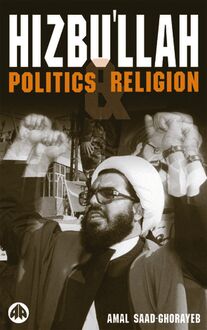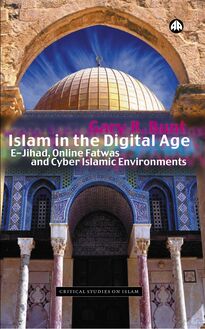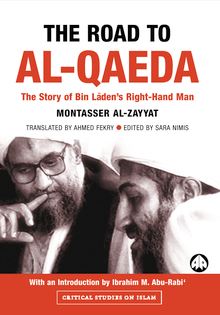-
 Univers
Univers
-
 Ebooks
Ebooks
-
 Livres audio
Livres audio
-
 Presse
Presse
-
 Podcasts
Podcasts
-
 BD
BD
-
 Documents
Documents
-
- Cours
- Révisions
- Ressources pédagogiques
- Sciences de l’éducation
- Manuels scolaires
- Langues
- Travaux de classe
- Annales de BEP
- Etudes supérieures
- Maternelle et primaire
- Fiches de lecture
- Orientation scolaire
- Méthodologie
- Corrigés de devoir
- Annales d’examens et concours
- Annales du bac
- Annales du brevet
- Rapports de stage
La lecture à portée de main
Vous pourrez modifier la taille du texte de cet ouvrage
Découvre YouScribe en t'inscrivant gratuitement
Je m'inscrisDécouvre YouScribe en t'inscrivant gratuitement
Je m'inscrisEn savoir plus
Vous pourrez modifier la taille du texte de cet ouvrage
En savoir plus

Description
Gary R. Bunt provides a fascinating account of the issues at stake, identifying two radical new concepts:
Firstly, the emergence of e-jihad ('Electronic Jihad') originating from diverse Muslim perspectives - this is described in its many forms relating to the different definitions of 'jihad', including on-line activism (ranging from promoting militaristic activities to hacking, to co-ordinating peaceful protests) and Muslim expression post 9/11.
Secondly, he discusses religious authority on the Internet - including the concept of on-line fatwas and their influence in diverse settings, and the complexities of conflicting notions of religious authority.
Glossary
1. Introduction
2. 'The Digital Sword'? and Defining 'E-Jihad'
3. Hacktivism, Hacking and Cracking in the Name of Islam
4. Cyber Islamic Reactions to 9-11: Mujahideen in Cyberspace
5. Cyber Islamic Reactions to 9-11: The ‘Inter-fada’ and Global E-jihad
6. Cyber-Islamic reactions to 9-11: Jihad for Peace
7. Islamic Decision Making and Advice Online
8. Sunni Religious Authority on the Internet I: Muslim Majority Contexts
9. Sunni Religious Authority on the Internet II: Muslim Minority Contexts
10. The Online Mujtahid: Islamic Diversity And Authority Online
11. Islam in the Digital Age
12. Bibliography
Index
Sujets
Informations
| Publié par | Pluto Press |
| Date de parution | 20 juillet 2003 |
| Nombre de lectures | 1 |
| EAN13 | 9780745348087 |
| Langue | English |
| Poids de l'ouvrage | 1 Mo |
Informations légales : prix de location à la page 0,0000€. Cette information est donnée uniquement à titre indicatif conformément à la législation en vigueur.
Extrait
First published 2003 by Pluto Press
New Wing, Somerset House, Strand, London, WC2R 1LA
www.plutobooks.com
Copyright Gary R. Bunt 2003
The right of Gary R. Bunt to be identified as the author of this work has been asserted by him in accordance with the Copyright, Designs and Patents Act 1988.
British Library Cataloguing in Publication Data A catalogue record for this book is available from the British Library
ISBN 9780745320984 Paperback
ISBN 9780745320991 Hardback
ISBN 9781849641944 PDF eBook
ISBN 9780745348087 EPUB eBook
Library of Congress Cataloging in Publication Data
Bunt, Gary R.
Islam in the digital age : e-jihad, online fatwas and cyber Islamic environments / Gary R. Bunt.
p. cm.
Includes bibliographical references.
ISBN 0-7453-2099-6 -- ISBN 0-7453-2098-8 (pbk.)
1. Islam--Computer network resources. 2. Jihad. 3. Fatwas. I. Title.
BP40.5 .B86 2003
297 .0285--dc21
2003004706
10 9 8 7 6 5 4 3 2 1
Designed and produced for Pluto Press by
Chase Publishing Services, Fortescue, Sidmouth, EX10 9QG, England Typeset from disk by Stanford DTP Services, Towcester, England Printed and bound in the European Union by
Antony Rowe, Chippenham and Eastbourne, England
For Yvonne, Kane and Tony
Contents
Acknowledgements
1 Introduction
Approaching Cyber Islamic Environments
Defining Cyber Islamic Environments
Accessing Cyber Islamic Environments
Analysing Cyber Islamic Environments
Researching Cyber Islamic Environments
Book Structure
Transliteration
2 The Digital Sword ? and Defining E-Jihad
The Symbolism of Jihad
The Greater and Lesser E-Jihad
3 Hacktivism, Hacking and Cracking in the Name of Islam
Hacking for Islam
The New Exegesis: Encryption and the Use of E-mail
4 Cyber Islamic Reactions to 9-11: Mujahideen in Cyberspace
5 Cyber Islamic Reactions to 9-11: The Inter-fada and Global E-jihad
6 Cyber Islamic Reactions to 9-11: Jihad for Peace
E-Jihad: Concluding Comments
7 Islamic Decision-Making and Advice Online
Defining Islamic Authority Online
8 Sunni Religious Authority on the Internet I: Muslim Majority Contexts
Analysis of Sunni Websites - Majority Contexts
Islam Q A
Fatwa-Online
Islam-Online
Other Influences in Sunni Majority Cyberspace
South East Asia
Bosnia
9 Sunni Religious Authority on the Internet II: Muslim Minority
Analysis of Sunni Websites - Minority Contexts
Ask-Imam.com
Troid.org
Pakistan Link
The Fiqh Council of North America
As-Sunna Foundation of America
Conclusion: Sunni Religious Authority on the Internet
10 The Online Mujtahid : Islamic Diversity and Authority Online
Locating Shi a Religious Authority on the Internet
Concluding Comment: Shi ism
Locating Sufi Religious Authority on the Internet
Other Perspectives
Islamic Religious Authority Online: Conclusion
11 Islam in the Digital Age
Bibliography
Glossary of Islamic Terminology
Index
Acknowledgements
The completion of this book would not have been possible without the help of a number of people.
The support of many colleagues and students at the University of Wales, Lampeter, has been welcomed. Neal Robinson read through early draft material and provided valuable comments. I am grateful to the organisers of various events for providing opportunities for aspects of this research to be presented, including conferences and workshops at, or organised by staff at, the University of Antwerp, University of Copenhagen, University of Leeds, Duke University, London School of Economics, Universit Lumi re Lyon 2, University of Surrey and University of Sussex. I have appreciated dialogues with the Muslim Networks Consortium, in particular miriam cooke and Bruce B. Lawrence at Duke University. The support of PRS-LTSN in enabling me to facilitate a paper and colloquium on Teaching Islam after 9-11 in 2002 is acknowledged. Many people have discussed aspects of this research with me (on- and off-line), and I have welcomed their comments. Thanks also to the editors and the team at Pluto Press.
Finally, my wife Yvonne provided indefatigable and sympathetic encouragement during the research and writing of Islam in the Digital Age . Kane Richard gave his unique form of editorial input. Other members of my family, particularly my parents Betty and Derek, and Tony, as always provided support and assistance.
Despite the valuable input of the above, the contents and shortcomings of this book remain wholly the writer s responsibility.
Gary R. Bunt Lampeter
1 Introduction
APPROACHING CYBER ISLAMIC ENVIRONMENTS
The writer s computer crashed completely whilst this chapter was being drafted. Some might interpret this as a sign of critical Divine Providence, although it was in fact a computer virus, something of an occupational hazard (the writer s firewall has since been updated). Internet and e-mail access became impossible. The writer, insulated in his office in west Wales, had lost contact with friends, colleagues and the sources of information usually consulted on a daily basis.
Given his research area, he considered what would happen if Islam , Muslims and Islamic organisations lost their computer access: the Qur an and other Islamic sources would not be lost forever. It would not be like the consequences of a battle after the death of Muhammad in 632, when so many individuals who had memorised the Qur an were killed that concerns were raised about the preservation of the sacred text, and according to tradition a decision was made to produce a definitive collection of the various texts: without the Internet, Islam as a religion may not lose anything that is intrinsic or central to beliefs. There would still be a hajj pilgrimage, although it might be organised differently without computers. There would still be prayers, although the calculation of timings might in some contexts revert to traditional methods. There would still be zakah , the annual tithe on Muslims, although some authorities would have problems without their accounting software. Scholars would still talk to one another and questions would still be asked, but the answers would be less immediate for some, and anonymity would be less ensured. In effect, Islam does not need computers; in many parts of the Muslim world , Islam is practised without computer interfaces or the use of a mouse, and the Internet may remain a rumour or a luxury in the hands of an elite.
So, why write about Islam and the Internet? Well, although Islam as a religion would function effectively, a substantial minority of Muslims and Islamic organisations would be bereft of their significant propagation and networking tool, unable to dialogue, research and disseminate their message to followers or to interested (Muslim and other) observers. Some would be bound by the shackles of state censorship, unable to access other forms of media, and restricted in the forms of local and global contact and dialogue facilitated through the Internet. Sermons would continue to be circulated, perhaps in print, by fax or cassette, but their immediacy would be lost. Decisions on points of interpretation and reactions to current events would become restricted in their diffusion. Individuals whose international status has been enhanced through the medium, even though they are unrecognised or seen as pariahs by some local authorities, would return to their restricted local networks and a relative obscurity. Some observers would suggest that such a development would not necessarily be a bad one, and indeed they would encourage the creation of barriers to knowledge and dissemination around such individuals and organisations.
In the post-11 September 2001 climate, overt and covert efforts have been made to facilitate such restrictions - although there is also a consciousness that the Internet is in fact a window (forgive the term) into aspects of the Muslim world and consciousness, which other forms of intelligence-gathering are unable to acquire. Whilst activism and Islamic activities (the two are not synonymous) were significant features of the Internet before September 2001, since that time they have acquired a new urgency and immediacy. The proliferation of Islamic websites, chat rooms, e-mail lists and other related media activity - including expressions of beliefs and the articulation of agendas - was a phenomenon heralding a maturity of Cyber Islamic Environments.
This is not to suggest that there was a lack of sophistication before that time; indeed, the extensive application of the Internet as a means of projecting Muslim authority and disseminating religious opinions represents a long-term and technologically adept integration of religious symbolism and traditional notions of power, wrapped up in a 56k modem and sent in digital packets on uncharted and twisted routes across the world. Measuring such activities and their impact is problematic; one scale might be to ask local imams and mosque leaders whether they would miss the Internet. Some might feel more secure without it: how many in their community no longer came to them for advice, preferring a Google search or a visit to an online scholar? Others might wonder where Friday s sermon might come from as they drew upon the media for inspiration, downloaded a pre-written sermon from an affiliated superior authority elsewhere in the world, or searched an online Qur an or hadith database for a tricky, half-remembered quotation. Some activists, seeking to synchronise the contents of sermons or discussions with their colleagues networked across the globe, would have to resort to more conventional channels of communication. Again, we may be talking about a minority, albeit a disproportionately influential one. The majority would retain their traditional, non-electronic connection with religious opinion and authority. Some scholars would suggest that this is not a bad thing: too many questions can distort beliefs. An analogy might be the physicians challenged by patients brandish
-
 Univers
Univers
-
 Ebooks
Ebooks
-
 Livres audio
Livres audio
-
 Presse
Presse
-
 Podcasts
Podcasts
-
 BD
BD
-
 Documents
Documents
-
Jeunesse
-
Littérature
-
Ressources professionnelles
-
Santé et bien-être
-
Savoirs
-
Education
-
Loisirs et hobbies
-
Art, musique et cinéma
-
Actualité et débat de société
-
Jeunesse
-
Littérature
-
Ressources professionnelles
-
Santé et bien-être
-
Savoirs
-
Education
-
Loisirs et hobbies
-
Art, musique et cinéma
-
Actualité et débat de société
-
Actualités
-
Lifestyle
-
Presse jeunesse
-
Presse professionnelle
-
Pratique
-
Presse sportive
-
Presse internationale
-
Culture & Médias
-
Action et Aventures
-
Science-fiction et Fantasy
-
Société
-
Jeunesse
-
Littérature
-
Ressources professionnelles
-
Santé et bien-être
-
Savoirs
-
Education
-
Loisirs et hobbies
-
Art, musique et cinéma
-
Actualité et débat de société
- Cours
- Révisions
- Ressources pédagogiques
- Sciences de l’éducation
- Manuels scolaires
- Langues
- Travaux de classe
- Annales de BEP
- Etudes supérieures
- Maternelle et primaire
- Fiches de lecture
- Orientation scolaire
- Méthodologie
- Corrigés de devoir
- Annales d’examens et concours
- Annales du bac
- Annales du brevet
- Rapports de stage









